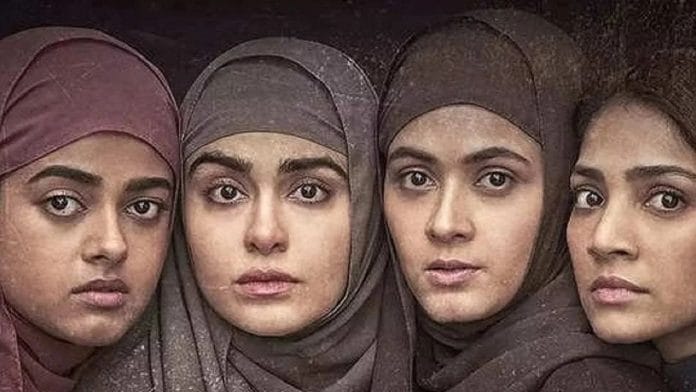Sudipto Sen’s The Kerala Story is centred around an identity crisis. A Malayali Hindu student is unsure of her religion and is influenced, nay manipulated, by her Muslim roommate to accept Islam. The method is heavy-handed, almost laughably so. Sen pulls a similar con on his audience. He repeats that the film is based on true events so many times—through disclaimers, dialogues, and even credits—that the impressionable ones leave believing that it is.
But just enough facts are woven into the fiction that you cannot absolutely call it a lie. That young women are brainwashed to join terrorist outfits like the Islamic State of Iraq and Syria (ISIS) is not wrong. But it happens all over India; Kerala doesn’t even top the list.
Where The Kerala Story turns into propaganda is in its use of broad generalisations, comical exaggerations and its absolute lack of nuance. According to the movie, all Muslims in the state are ISIS sympathisers, with posters in their bedrooms that read ‘Nationalism is haram, being Muslim is your identity’, replete with the terror outfit’s key symbol. Accepting this faulty portrayal as the ‘hidden truth’ will do nothing but fuel communal and regional fires. Just like in Vivek Agnihotri’s The Kashmir Files (2022), the actual victims will be left in the lurch.
Also read: Afwaah is Sudhir Mishra’s battle cry against WhatsApp rumors, viral videos and fake news
An over-the-top, propagandist plot
The Kerala Story opens with Shalini Unnikrishnan (played by Adah Sharma), now Fatima, in a United Nations facility on the Afghanistan-Iran border. She narrates the tale of how she was brainwashed into going to Syria. All of Kerala is a time bomb, she says. The story checks all the boxes of a ‘nationalist’ Hindi film— love jihad, communism as the root cause, drugs as a means of control, madrasas as the centre of the ‘operation’, and State inaction.
Her story begins when she moves from Thiruvananthapuram to Kasargod to attend nursing college. An auto with ‘Allahu Akbar’ written on the windshield drops her off. The college is spray painted with ‘Free Kashmir’ slogans, the ISIS logo, Osama Bin Laden and more. Subtlety is not Sen’s strong suit.
She shares her hostel room with three other girls. Geetanjali (played by Siddhi Idnani), a Hindu from Kochi who was raised atheist (and immediately and explicitly identified as Communist), Nimah (played by Yogita Bihani), a Christian from Kottayam, and Asifa (played by Sonia Balani), a Muslim.
“Let me guess. You’re either from Malappuram or Kozhikode,” Shalini asks as the hijab-donning Asifa walks in. Muslims are spread across the state, but these two districts have become buzzwords for Islamophobes, with Amit Shah even calling Malappuram Mini-Pakistan once. The reference is like a nasty inside joke.
The rest of the movie follows the absurd ways Asifa manipulates the rest of them. For instance, she warns them that not praying before eating is a sin. You will burn in hellfire for it, she says. To which Shalini responds — what is hellfire?
Next, the girls are molested in a mall, and Asifa blames it on their bare heads, saying that the incident wouldn’t have occurred had they worn the hijab. The Hindu girls unquestioningly start following in the woman’s footsteps.
The Christian does not fall for it; her faith is too strong. Only ‘naïve’ Hindu women with a lack of faith are victims.
When Geetanjali realises she’s being manipulated, she blames her communist father — “It’s your fault too; you shunned our Hindu traditions and only taught me these foreign values.”
Also read: Kisi Ka Bhai Kisi Ki Jaan’s last fight is the best one. It means you finally get to leave
Graphic scenes, poor writing
The dialogues (written by Sen, Vipul Amrutlal Shah and Suryapal Singh) are trilingual, switching between Malayalam, Hindi and English. Cringe is the most apt descriptor.
I begrudgingly appreciate the attempt to include Malayalam, but when the Keralites speak Hindi better than they do their mother tongue, the effect is just jarring. It’s not just the accent; even the sentences are constructed awkwardly, and the grammar is not right.
Sharma’s acting is over-the-top, which makes it difficult to empathise with her and her situation. But it would be unfair just to blame her when the entire cast was clearly leaning toward the melodramatic.
A special mention must be given to the movie’s background score. It’s as if composers Viresh Sreevalsa and Bishakh Jyoti lifted it straight off a formulaic horror flick. A repetitive whipping sound was used generously, taking away from the little emotion on screen.
Sen also used multiple graphic scenes of rape, gore, and mutilation, which were not just uncomfortable but also unnecessary. Bad CGI only made it worse.
At times, The Kerala Story was so absurd it felt like a joke but, as I left the hall, I heard multiple people lauding it as a must-watch. It shows “the real truth”, they said. It was a bitter reminder that propaganda doesn’t need to be factual or even good for it to be effective.
(Edited by Zoya Bhatti)






